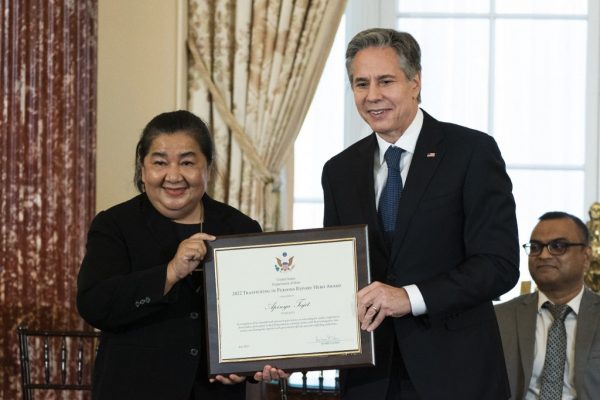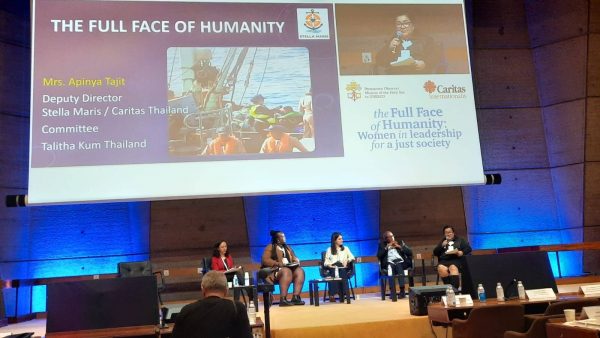For the past 18 years, Apinya Tajit has been at the forefront of her fight against human trafficking and forced labour, especially in the fishing industry, both in Thailand and in neighbouring countries.
Earlier this year, Apinya received the TIP Report Heroes Award from the US Secretary of State, Antony Blinken. She is the third Thai citizen to receive the award.
Currently, being the Deputy Director of Stella Maris Seafarers’ Centre, most of her work involves helping workers who are vulnerable to labour exploitation in the Thai fishing industry.
Apinya’s determination began when she visited workers at the ports, when she would encourage them to get involved in religious activities. Once they began to trust her, they would reveal how they had been mistreated and exploited at sea. This naturally inspired her to take action against human trafficking.
“Whether [they experienced] malnutrition or not getting paid, it all indicates human trafficking,” she said.
“So we felt that we must help these workers, because they would feel that they were stranded in the middle of the ocean, without knowing when they will get back to shore. If we do not help them, we should feel bad.”

The TIP ranking vs reality
This year, Thailand was promoted from the Tier 2 “Watch List” to Tier 2 in the United States’ 2022 Trafficking in Persons (TIP) Report. This can be viewed as a significant improvement, considering that Thailand received the lowest ranking, Tier 3, back in 2014 and 2015.
Being moved up or down on the list can have a significant impact on the Thai government’s international reputation, where the worst ranking can prevent a country from receiving assistance funding from the US government.
According to the explanation in this year’s TIP report, the Thai government has demonstrated increasing efforts to combat human trafficking.
“[The report] was just an overview,” Apinya explains, indicating that there’s more to the problem that meets the eye.
Even though human trafficking cases in the report may appear to have decreased, Apinya revealed that most such cases do not occur in Thailand.
In fact, the country has often been used as a transit point for human traffickers, who are usually foreigners. One of the clearest examples is how Thai migrants have been lured to work as tele-scammers in nearby countries. Apinya also pointed out that the report saw fewer cases because victims were reluctant to tell the truth.
“Even though the number of cases has decreased, there are more and more victims being affected,” she said. “For example, we helped a total of 800 victims from Phnom Penh, Cambodia, but only 200 of them were willing to provide official statements. So, if the victims are not cooperating or are reluctant to tell the truth to the police, it would be hard for us to continue.”
Hidden problems
The victims’ fear of telling the truth is already a huge obstacle for Apinya and her team in solving human trafficking cases. The worst cases she has had to deal were very often when victims have engaged in prior settlements, which prevent them from reporting to the police in exchange for money, assets or even their families’ safety.
“When we first talked to the workers [who asked us for help], we gathered a lot of information. We were confident that they were human trafficking victims. Once when they were rescued, however, we ended up seeing their relatives or someone else negotiating with the victims so that they don’t report to the police.”
Sadly, the bigger problem, which push these workers into forced labour and the human trafficking cycle, is their low income. This is what Apinya thinks is the hardest problem to fix.
“Based on their circumstances, they have no choice. If they refuse to work, they will not have enough money to feed their families. I think the economic system in each country has led them into becoming victims of human trafficking. So this is hard to fix, because it requires cooperation from the government sector.”
As she works closely with government authorities, Apinya has seen improvements in tackling human trafficking cases, but there is much more which can be done.
With most of the work in the fishing industry being unskilled, Apinya hopes to see more changes in terms of the health and work safety training, where workers are educated about their fundamental rights and how to seek help if they fall victim to exploitation.
“What we’re doing more often are health and safety training courses for workers in the fisheries, in which we teach them the necessary skills and about their rights.”

Women can be heroes
Gender is not an issue in activism for Apinya. In fact, she feels that being a woman is an advantage, particularly when approaching victims. In some cases, she has managed to convince wrongdoers to confess to their crimes.
Therefore, the TIP report hero scheme believes in women’s competence in tackling tough issues in society, including human trafficking, and that they can eventually evolve into heroines.
“I think women have so much competence and there are many ways out there in which women can help and protect their communities and society. For that reason, we should all love, respect and honour these women, because women have played a huge role in tackling so many issues [in society].”
One final encouragement that Apinya would like to offerwomen, especially those who are struggling in life, is that they’re not alone.
“Many women have transformed their lives, from being a victim to a heroine. I used to be a victim of domestic violence but, when we decide to fight, we can all become heroines. Women can become heroines and women have the power to help others.”
By Nad Bunnag, Thai PBS World

